Life and Physical Sciences Research

Areas of Research

Dr. Zahra Afrasiabi
Zahra Afrasiabi is an Associate Professor of Chemistry at Lincoln University. She has adjunct research  appointments with the University of Missouri-Columbia and Missouri University of Science and Technology. Her research focuses on application of nanotechnology in biological and environmental domains. She has ongoing funded projects on developing nanosensors for detection of biomolecules, application of nanomaterials as pesticides, and integration of nanotechnology in agriculture and environmental science curricula. Dr. Afrasiabi is also involved in drug designing research, with a focus on natural and synthetic compounds with antitumor properties.
appointments with the University of Missouri-Columbia and Missouri University of Science and Technology. Her research focuses on application of nanotechnology in biological and environmental domains. She has ongoing funded projects on developing nanosensors for detection of biomolecules, application of nanomaterials as pesticides, and integration of nanotechnology in agriculture and environmental science curricula. Dr. Afrasiabi is also involved in drug designing research, with a focus on natural and synthetic compounds with antitumor properties.
Dr. Sunder Balasubramanian
Sunder Balasubramanian is an Associate Professor of Physics at Lincoln University and an Adjunct Professor of Physics at the University of Missouri. His research interests are in electronic transport in semiconductors, biomedical coherent domain and diffused-photon imaging, adaptive holography, non-destructive testing using opto-acoustic platforms, and in physics education. He has worked to include physics as a mandatory science course in K-12 at the 9th grade level in mid-Missouri and elsewhere in the state. Over 40 percent of Missouri 9th graders now take physics in their school due to Dr. Balasubramanian's efforts and the efforts of similar Physics First initiatives. The Army Research Laboratory, the National Science Foundation, the National Institute of Health, NASA, and USDA have funded his work. He is the recipient of the 2011 Governor's Award for Excellence in Education, and is Past-President of the Missouri Association of Physics Teachers.
of Physics at the University of Missouri. His research interests are in electronic transport in semiconductors, biomedical coherent domain and diffused-photon imaging, adaptive holography, non-destructive testing using opto-acoustic platforms, and in physics education. He has worked to include physics as a mandatory science course in K-12 at the 9th grade level in mid-Missouri and elsewhere in the state. Over 40 percent of Missouri 9th graders now take physics in their school due to Dr. Balasubramanian's efforts and the efforts of similar Physics First initiatives. The Army Research Laboratory, the National Science Foundation, the National Institute of Health, NASA, and USDA have funded his work. He is the recipient of the 2011 Governor's Award for Excellence in Education, and is Past-President of the Missouri Association of Physics Teachers.
Dr. Jennifer R. Benne
Jennifer Benne is a Professor of Biology and the Department Head of Life and Physical Sciences at Lincoln University. Dr. Benne's current research interest is in genetic influences on mosquito physiology and 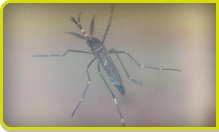 ecology. She is currently working on a USDA funded project, "Phenotypic Plasticity in Mosquito Populations: Potential for Disease Transmission." Collection and maintenance of a variety of mosquito strains from varying geographic locales for observation of variation in phenotypic plasticity within and between these strains provides information about how changing environmental factors could shape future disease cycles. Her interests also involve the examination of existing populations in a small geographic region to determine cooperation and competition in habitats and hosts for mosquito species. Dr. Benne's lab utilizes molecular techniques to investigate possible genetic loci associated with variation in mosquito size.
ecology. She is currently working on a USDA funded project, "Phenotypic Plasticity in Mosquito Populations: Potential for Disease Transmission." Collection and maintenance of a variety of mosquito strains from varying geographic locales for observation of variation in phenotypic plasticity within and between these strains provides information about how changing environmental factors could shape future disease cycles. Her interests also involve the examination of existing populations in a small geographic region to determine cooperation and competition in habitats and hosts for mosquito species. Dr. Benne's lab utilizes molecular techniques to investigate possible genetic loci associated with variation in mosquito size.
Dr. Keesoo Lee
Keesoo Lee is a Professor of Microbiology in the Department of Life and Physical Sciences at Lincoln 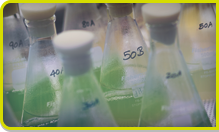 University. She also serves as a Director of the Center for Bioenergy, which focuses on the production of renewable biofuel and other high value biomaterials from algae. Her research also involves the development of disinfectants, detection and decontamination of biological warfare agents, such as anthrax.
University. She also serves as a Director of the Center for Bioenergy, which focuses on the production of renewable biofuel and other high value biomaterials from algae. Her research also involves the development of disinfectants, detection and decontamination of biological warfare agents, such as anthrax.
Dr. Leilani Ramos
Leilani Ramos is an Associate Professor of Chemistry at Lincoln University, teaching organic, biological and 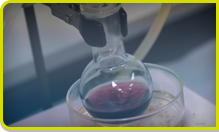 analytical chemistry classes. Her students do research in the area of analytical chemistry, where cellulosic materials, such as cornhusk, are evaluated for use in low-cost cation exchange applications. She has received funding in curriculum development and evaluation of organic chemistry courses and army CBRN training. Dr. Ramos is a co-PI of the HBCU-UP implementation grant AMASS(A Model for Achieving Success in STEM), which links faculty development efforts with projects that increase retention and integrated training for nontraditional, minority and underrepresented students in STEM disciplines.
analytical chemistry classes. Her students do research in the area of analytical chemistry, where cellulosic materials, such as cornhusk, are evaluated for use in low-cost cation exchange applications. She has received funding in curriculum development and evaluation of organic chemistry courses and army CBRN training. Dr. Ramos is a co-PI of the HBCU-UP implementation grant AMASS(A Model for Achieving Success in STEM), which links faculty development efforts with projects that increase retention and integrated training for nontraditional, minority and underrepresented students in STEM disciplines.
Dr. Michael Scott
Dr. Michael Scott is a Professor of Biology in the Department of Life and Physical Sciences and has an appointment as Graduate Faculty. His recent work has focused on developing research related infrastructure 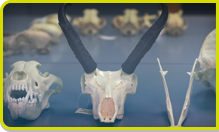 and providing experiential learning opportunities for students interested in ecology and natural history. At the current time, he is developing a Virtual Museum of Natural History as a centralized portal system for collections of biological specimens. His work has been funded by the United States Department of Agriculture, National Institutes of Health and National Science Foundation. Dr. Scott has received the Missouri Governor's Award for Performance Excellence in Education as a member of the National Science Foundation Missouri Alliance for Minority Participation.
and providing experiential learning opportunities for students interested in ecology and natural history. At the current time, he is developing a Virtual Museum of Natural History as a centralized portal system for collections of biological specimens. His work has been funded by the United States Department of Agriculture, National Institutes of Health and National Science Foundation. Dr. Scott has received the Missouri Governor's Award for Performance Excellence in Education as a member of the National Science Foundation Missouri Alliance for Minority Participation.
Dr. Kirsten Stephan
Dr. Kirsten Stephan is an Assistant Professor of Biology in the Department of Life and Physical Sciences and 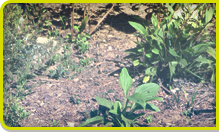 the Urban Forester for Cooperative Research at Lincoln University. Her current research focuses on fire effects on plant communities and soil chemistry in oak-hickory forests and the spatial heterogeneity in regenerating soil and vegetation in an abandoned urban limestone quarry. Research funding sources include the Department of Defense and McIntire-Stennis formula funds. Dr. Stephan also curates the Lincoln University Herbarium.
the Urban Forester for Cooperative Research at Lincoln University. Her current research focuses on fire effects on plant communities and soil chemistry in oak-hickory forests and the spatial heterogeneity in regenerating soil and vegetation in an abandoned urban limestone quarry. Research funding sources include the Department of Defense and McIntire-Stennis formula funds. Dr. Stephan also curates the Lincoln University Herbarium.
Dr. Aimee Busalacki
Aimee Busalacki is Associate Professor of Biology at Lincoln University and an Adjunct Assistant Professor of  Animal Sciences at the University of Missouri. Her research includes current studies on embryonic and fetal losses in small ruminants, roles of integrins in ruminant placentation, endocrine profiling and small ruminant care and management. Further, Dr. Busalacki has a keen interest in undergraduate learning and has conducted research in online science education and agricultural ethics. Dr. Busalacki's research has been funded by the USDA and NIH. She has also served on several grant panels and editorial boards in her discipline area.
Animal Sciences at the University of Missouri. Her research includes current studies on embryonic and fetal losses in small ruminants, roles of integrins in ruminant placentation, endocrine profiling and small ruminant care and management. Further, Dr. Busalacki has a keen interest in undergraduate learning and has conducted research in online science education and agricultural ethics. Dr. Busalacki's research has been funded by the USDA and NIH. She has also served on several grant panels and editorial boards in her discipline area.
